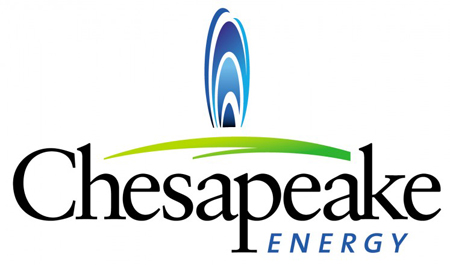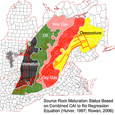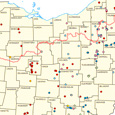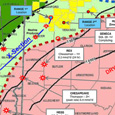Chesapeake to Pay $3.2 Million to Resolve Clean Water Violations
Thursday, December 26, 2013

WASHINGTON — The Department of Justice and the U.S. Environmental Protection Agency announced Dec. 19 that Chesapeake Appalachia LLC, a subsidiary of Chesapeake Energy, will spend an EPA-estimated $6.5 million to restore 27 sites damaged by unauthorized discharges of fill material into streams and wetlands and to implement a comprehensive plan to comply with federal and state water protection laws at the company’s natural gas extraction sites in West Virginia, many of which involve hydraulic fracturing operations.
Civil penalty
The company will also pay a civil penalty of $3.2 million, one of the largest ever levied by the federal government for violations of Section 404 of the Clean Water Act, which prohibits the filling or damming of wetlands, rivers, streams, and other waters of the United States without a federal permit.
“Wetlands and streams serve important roles in the aquatic ecosystem by supporting aquatic life and wildlife. Wetlands also play a valuable role in recharging our groundwater and drinking supplies, and reducing flood risks,” said EPA Regional Administrator Shawn M. Garvin. “This case sends a clear message that EPA and other federal and state regulatory agencies will do what is necessary to ensure compliance with the Clean Water Act and to protect these valuable resources and the health of our communities.”
No federal permit
The federal government and the West Virginia Department of Environmental Protection allege that the company impounded streams and discharged sand, dirt, rocks and other fill material into streams and wetlands without a federal permit in order to construct well pads, impoundments, road crossings and other facilities related to natural gas extraction.
Wetlands, streams
The alleged violations being resolved by the settlement occurred at 27 sites located in the West Virginia Counties of Boone, Kanawha, Lewis, Marshall, Mingo, Preston, Upshur and Wetzel, including 16 sites involving hydraulic fracturing operations. The government alleges that the violations impacted approximately 12,000 linear feet of stream, or approximately 2.2 miles, and more than three acres of wetlands.
Restoration
The settlement requires that the company fully restore the wetlands and streams wherever feasible, monitor the restored sites for up to 10 years to assure the success of the restoration, and implement a comprehensive compliance program to ensure future compliance with the CWA and applicable state law.
To offset the impacts to sites that cannot be restored, the company will perform compensatory mitigation, which will likely involve purchasing credits from a wetland mitigation bank located in a local watershed.
27 sites
The alleged violations being resolved by the settlement occurred at 27 sites located in the West Virginia Counties of Boone, Kanawha, Lewis, Marshall, Mingo, Preston, Upshur and Wetzel. EPA discovered some of the violations through information provided by the public and routine inspections.
In addition, the company voluntarily disclosed potential violations at 19 of the sites following an internal audit. In 2010 and 2011, EPA issued administrative compliance orders for violations at 11 sites. Since that time, the company has been correcting the violations and restoring those sites in full compliance with EPA’s orders.
The settlement also resolves alleged violations of state law brought by WVDEP. The state of West Virginia is a co-plaintiff in the settlement and will receive half of the civil penalty.
Blake Fork
In a related case, in December 2012, the company pleaded guilty to three violations of the CWA related to natural gas extraction activity in Wetzel County, at one of the sites subject to the settlement.
The company was sentenced to pay a $600,000 penalty to the federal government for discharging crushed stone and gravel into Blake Fork, a local stream, to create a roadway to improve access to a drilling site. The company has already fully restored the damage done to the site.
Consequences
Filling wetlands illegally and damming streams can result in serious environmental consequences. Streams, rivers, and wetlands benefit the environment by reducing flood risks, filtering pollutants, recharging groundwater and drinking water supplies, and providing food and habitat for aquatic species.
The consent decree, lodged today in the Northern District of West Virginia, is subject to a 30-day public comment period and court approval. The consent decree is available for review at www.justice.gov/enrd/Consent_Decrees.html




